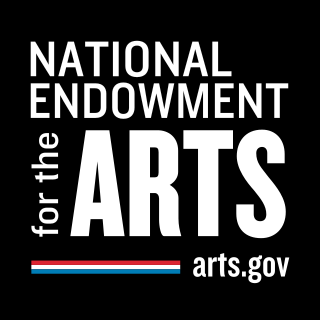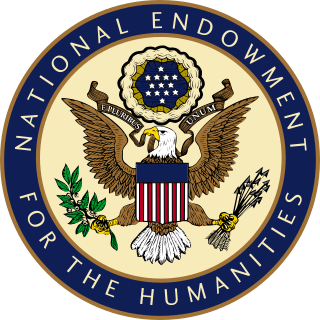The Ford Foundation is an American private foundation with the stated goal of advancing human welfare. Created in 1936 by Edsel Ford and his father Henry Ford, it was originally funded by a US$25,000 gift from Edsel Ford. By 1947, after the death of the two founders, the foundation owned 90% of the non-voting shares of the Ford Motor Company. Between 1955 and 1974, the foundation sold its Ford Motor Company holdings and now plays no role in the automobile company.
The Canada Council for the Arts, commonly called the Canada Council, is a Crown corporation established in 1957 as an arts council of the Government of Canada. It acts as the federal government's principal instrument for funding public arts, as well as for fostering and promoting the study and enjoyment of, and the production of works in, the arts.

The National Endowment for the Arts (NEA) is an independent agency of the United States federal government that offers support and funding for projects exhibiting artistic excellence. It was created in 1965 as an independent agency of the federal government by an act of the U.S. Congress, signed by President Lyndon B. Johnson on September 29, 1965. It is a sub-agency of the National Foundation on the Arts and the Humanities, along with the National Endowment for the Humanities, the Federal Council on the Arts and the Humanities, and the Institute of Museum and Library Services.

The National Endowment for the Humanities (NEH) is an independent federal agency of the U.S. government, established by the National Foundation on the Arts and the Humanities Act of 1965, dedicated to supporting research, education, preservation, and public programs in the humanities. The NEH is housed at 400 7th St SW, Washington, D.C. From 1979 to 2014, NEH was at 1100 Pennsylvania Avenue, N.W., Washington, D.C., in the Nancy Hanks Center at the Old Post Office.

A financial endowment is a legal structure for managing, and in many cases indefinitely perpetuating, a pool of financial, real estate, or other investments for a specific purpose according to the will of its founders and donors. Endowments are often structured so that the inflation-adjusted principal or "corpus" value is kept intact, while a portion of the fund can be spent each year, utilizing a prudent spending policy.
Joseph Louis Rotman,, was a noted Canadian businessman and philanthropist. Rotman was the founder, benefactor and member of many successful organizations, such as the Clairvest Group Inc., the Rotman Research Institute, the Rotman School of Management, and the Rotman Institute of Philosophy. Throughout his life, he received three honorary degrees, as well as an induction into the Canadian Business Hall of Fame. He is well-regarded for donating his time and financial assistance to numerous philanthropic causes including the arts, education and healthcare.
The Ontario Arts Council (OAC) is a publicly-funded Canadian organization in the province of Ontario whose purpose is to foster the creation and production of art for the benefit of all Ontarians. Based in Toronto, OAC was founded in 1963 by Ontario's Premier at the time, John Robarts.
Anthony "Tony" Belcourt OC is a Métis Rights leader and activist in Canada. He was the first president of the Native Council of Canada (1971-1974). He is best known for his work as the founding President of the Métis Nation of Ontario in 1993 and his leadership through the Powley Case in 2003.
Arts administration is a field in the arts sector that facilitates programming within cultural organizations. Arts administrators are responsible for facilitating the day-to-day operations of the organization as well as the long term goals by and fulfilling its vision, mission and mandate. Arts management became present in the arts and culture sector in the 1960s. Organizations include professional non-profit entities. For examples theaters, museums, symphonies, jazz organizations, opera houses, ballet companies and many smaller professional and non-professional for-profit arts-related organizations. The duties of an arts administrator can include staff management, marketing, budget management, public relations, fundraising, program development evaluation, and board relations.
Arts Etobicoke was founded in 1973 in Toronto, Ontario, Canada. They are an incorporated not-for-profit arts council governed by a volunteer Board of Directors from business, the arts and the community. They serve thousands of students in their arts education programs, a membership of 50 arts organizations, 200 individual members, 60 individual artists and clients in an Art Rental program, hundreds of artists through their arts programming and exhibitions, 22 scholarship recipients, the general public and numerous project partners.
The Canadian Race Relations Foundation is a charitable organization and Crown corporation responsible to foster racial harmony and cross-cultural understanding and help to eliminate racism in Canada.

Clement Willis Bowman was a Canadian chemical engineer, the founding chairperson of the Alberta Oil Sands Technology and Research Authority. He was a Member of the Order of Canada and a recipient of the Global Energy Prize.

Craft Ontario, legally known as the Ontario Crafts Council (OCC), is a member-based, not-for-profit arts service organization based in Toronto, Ontario, Canada. The organization is dedicated to promoting the recognition and appreciation of craft and craftspeople in Ontario and beyond.

The Delaware Valley Legacy Fund (DVLF) is a community foundation whose mission is to support the needs of the lesbian, gay, bisexual, and transgender (LGBT) and straight-allied communities in Eastern Pennsylvania, Delaware, and New Jersey. It is engaged in building a permanent endowment and philanthropic apparatus to serve the fundraising and grant making. DVLF was founded in 1993 and is based in Center City Philadelphia.

Michael James Audain, is a Canadian home builder, philanthropist and art collector. He is the Chairman and major shareholder of the privately held Polygon Homes Ltd., one of the largest multi-family builders in British Columbia.
The Michaëlle Jean Foundation is an independent non-profit organization established by former Governor General of Canada Michaëlle Jean upon her retirement from that position in 2010. Its aim is to collaborate with other Canadian organizations across Canada to work with disadvantaged youth and effect change in their communities through the arts. The co-presidents of the foundation are Michaëlle Jean and her husband Jean-Daniel Lafond who also serves as CEO.

The Tiger Athletic Foundation (TAF) is a private, non-profit corporation dedicated to supporting Louisiana State University (LSU) and its athletics program. It is the primary source of private funding for LSU athletics and contributions to TAF benefit every athlete and every team at LSU. TAF has become a critical element in the success of LSU Athletics by providing private funding for scholarships, academic rewards, new athletic facilities and facility upgrades. In addition to contributions to the athletic scholarship fund, TAF will continue to provide funding for academic programs and facilities that benefit all LSU students.
The Wisconsin Arts Board (WAB) is a state agency based in Madison, Wisconsin. It is one of fifty-six state art agencies of the United States and works as a partner regionally with Arts Midwest and nationally with the National Endowment of the Arts. WAB's mission statement declares that it “is the state agency which nurtures creativity, cultivates expression, promotes the arts, supports the arts in education, stimulates community and economic development and serves as a resource for people of every cultural heritage.”
Luis Antonio Ubiñas is an American investor, businessman and nonprofit leader. He holds various influential roles in both the corporate and nonprofit sectors. Currently, he is the Chairman of the Statue of Liberty-Ellis Island Foundation, demonstrating his commitment to preserving this iconic symbol of American immigration history. Ubiñas served as the president of the Ford Foundation from 2008 through 2013 and had a successful 18-year career as a senior partner at McKinsey & Company before joining the Ford Foundation. In the corporate world, he is actively involved as a board member of several public and private corporations, including Electronic Arts, where he serves as Lead Director and chairs the Nominating and Governance Committee, as well as ATT and Tanger. Additionally, he provides valuable advice to various private companies, such as Ebsco, a digital information provider. In the nonprofit sector, he served as president of the Board of Trustees of the Pan American Development Foundation from 2015 to 2019, and serves as an Advisory Committee member for the United Nations Fund for International Partnership. His commitment to the arts is also noteworthy, as he is an avid collector, donor, and board member.
CETA Employment of Artists(1974–1981) refers to the Comprehensive Employment and Training Act (CETA), which federally employed more than 10,000 artists – visual, performing, and literary – during a span of eight years. This was the largest number of artists supported by Federal funding since the Works Progress Administration (WPA) of the 1930s. It is estimated that an additional 10,000 arts support staff were funded as well. During its peak year, 1980, CETA funding for arts employment funneled up to $300 million into the cultural sector – and the economy – of the United States. In comparison, the National Endowment for the Arts budget that year was $159 million.








